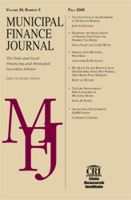Complete Issue Volume 43, Nos. 2 & 3
Author: W. Bartley Hildreth.
Source: Volume 43, Number 03, Fall 2022 , pp.1-126(126)

< previous article |return to table of contents
Abstract:
This contains the complete contents of Municipal Finance Journal’s double issue (Volume 43, Nos. 2 & 3, Summer & Fall 2022) devoted to the NFMA 2022 Annual Conference was held May 17–20, 2022, in Las Vegas, Nevada. Since 1992, the Municipal Finance Journal has published edited proceedings from the annual conference of the National Federation of Municipal Analysts. The NFMA is an association of eight municipal analyst societies and affiliated individuals around the country. Its mission is to enhance the professional development and analytical contributions of municipal market participants. The NFMA is composed of nearly 1,200 members, primarily research analysts, who examine the credit risks and other attributes of municipal securities. The pandemic had a significant impact on cities that are leisure and tourism based, so it is fitting that the conference opens with a Fireside Chat conducted by NFMA chair Rachel Barkley with Steve D. Hill, the head of the Las Vegas Convention and Visitors Authority. The story of the pandemic and Las Vegas follows a swing from the devastating closure of hotels and events to the eventual recovery. The discussion covers the convention center and monorail, the new stadium, efforts taken to attract a more diversified economy and the return of international visitors, airport capacity issues, and climate change. Hospitality bonds are the subject of a panel moderated by bankruptcy and restructuring attorney Kaitlin Walsh. Hospitality operator Alexandra Walterspiel provides engaging data for the panel. Institutional analyst Ellen Rossi focuses on investor considerations, including the revenues that are available to pay the debt service, bond yields, and bondholder rights. Hospitality consultant Alan Tantleff highlights the unprecedented decline in revenue per available room and the loss, temporarily or permanently, of a lot of supply. He notes that the “hotel industry, tourism and travel, is the world’s largest employer of unskilled labor.” This panel highlights that the pandemic affected various hospitality venues differently. An industry roundtable, moderated by municipal analyst Anne Ross, primarily focuses on materiality concerns in disclosures ranging from COVID and ESG (environmental, social, and governance) to cyber issues. Dave Sanchez, director of the Securities and Exchange Commission’s Office of Municipal Securities, speaks to the limited role of the SEC, yet the liability anxiety caused by the nature of municipal voluntary disclosure. Mark Kim, chief executive officer of the Municipal Securities Rulemaking Board, discusses its regulatory agenda and welcomes market-based solutions to disclosure concerns. Emily Swenson Brock, representing the Government Finance Officers Association, points to pension and COVID disclosures in particular. Bond counsel Kimberly Magrini clarifies materiality given the diligence request list used by counsel. Market participants generally call for more data on municipal credits, but this panel on the data revolution in the market asks what information actually drives decision making, raising the materiality question again. Analyst Justin Land moderates this intriguing session, which addresses current data concerns as well as what the analyst’s role will look like ten years from now. Municipal advisor Liz Sweeney conveys the landscape of data developments, seen especially from her role as an MSRB board member. Triet Nguyen, at DPC Data, reviews the current data flow while recognizing the need for granular, real-time data as part of a new digital age for this market. Abhishek Lodha, given his role in product development for a financial guarantor, calls for workflow changes and an objective framework to enhance data and analytics while avoiding the potential for bias. Because social and governance credit factors are harder to pin down than the environmental factor in ESG, ratings analyst Marcy Block moderates a panel that explores these issues. Investment banker Sally Bednar traces the interest in ESG-designated bond issues with examples of pricing advantages, including details on the path-setting Ford Foundation issuance. As head of a second-party/external opinion provider on ESG issues, Monica Reid describes her company’s due diligence process with regard to social bonds as well as to issues involving self-verification. Carol Jeppesen reviews the United Nations Principles for Responsible Investment, for which she serves as U.S. head, and discusses the materiality of social factors. The panel ends with a discussion on post-issuance disclosure concerns. Taxable municipal bonds are a substantial segment of the municipal market, as the panel moderated by credit analyst David Gao demonstrates. Investment strategist Vikram Rai discusses the current landscape of the taxable municipal market given the reluctance of issuers to do taxable deals. Investment strategist Mikhail Foux provides insights into the purchasers of taxable munis, noting that ESG factors are not very important to them. He also offers insights into the choice between a par call structure versus a make-whole call. Together, the panelists explore the value for taxable munis in terms of rating sector and maturity. They are not optimistic about a successor taxable bond option program like the 2010 Build American Bonds (BABs) program. America’s reliance upon a transportation network that is underfunded leads portfolio manager John Hylle to moderate a panel focused on fuel taxes. Public finance professor Denvil Duncan provides the history of fuel taxation in the United States, with details on rates and revenue reliance. Investment banker David Klinges addresses municipal bond credit concerns due to declining fuel tax revenues and their bleak forecast compared to the growing cost of transportation investments. Alternative revenue sources, such as road usage charges and tolls, are discussed by federal transportation specialist Angela Fogle. Guided by audience questions, the panelists delve into a wide range of issues, such as investments, alternatives, affordability, and the future of transportation financing.Keywords: Hospitality Industry; Municipal Bond Market; Assessment of Credit Risk; Machine-Readable Data and Municipal Bond Disclosure; Socially Responsible Investing; Environmental, Social, and Governance (ESG) Factors; Taxable Municipal Bonds; Fuel Tax Revenu
Affiliations:
1: Journal Editor.